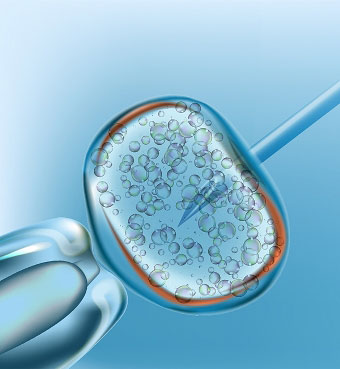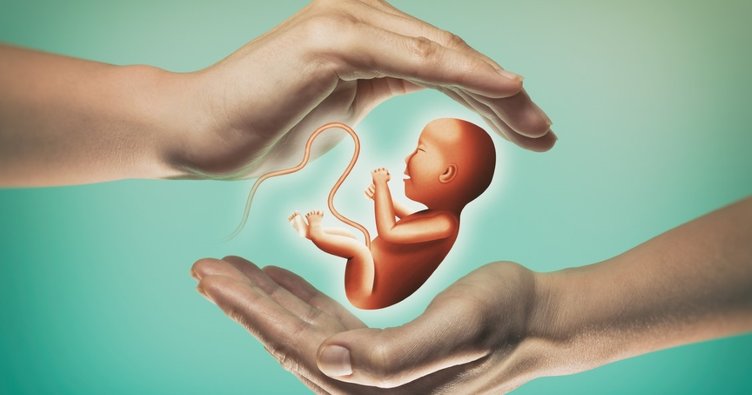









It is recommended that couples have health check-ups if they cannot achieve pregnancy despite having regular and unprotected sexual intercourse for 1 year. If the expectant mother is older than 35, the waiting period is 6 months. In order to achieve pregnancy naturally, the hormonal system and many different organs, as well as the female reproductive system, must work together and in harmony with each other. First of all, the hypothalamus region in the brain stimulates the pituitary gland, which is also located in the brain. The pituitary gland secretes LH and FSH hormones. Hormones reaching the ovaries through the circulatory system stimulate the egg follicles in the ovarian reserve. Thus, some of the eggs enter the maturation process. With the cracking of the most healthy egg, the egg is thrown into the fallopian tubes, a kind of channel between the ovary and the uterus. The lifespan of the egg to be fertilized here is about 24 hours. However, sperm, which is a male reproductive cell, can survive in the female body for 4-5 days. Therefore, in case of sexual intercourse before ovulation or on the day of ovulation, fertilization can occur.
During this process, the follicle in which the egg is located secretes estrogen, causing the uterine wall to thicken. After the egg is fertilized, it comes to the uterus and pregnancy begins when the embryo attaches to the thickened uterine wall. During this whole process, different reproductive problems may occur in men or women. In this case, the couple may consider the option of in vitro fertilization, which is one of the assisted reproductive treatment methods, after the examinations and tests. In IVF treatment, eggs collected from the mother-to-be and sperm cells taken from the father-to-be are fertilized in the laboratory environment, and then the resulting embryo is placed in the uterus of the mother-to-be by embryo transfer method. The Beta HCG level of the expectant mother is checked with a blood test performed approximately 2 weeks later. If the test result shows that the pregnancy has been successfully achieved, the pregnancy process begins. Pregnancies provided by IVF treatment are no different from pregnancies obtained naturally. The pregnancy process continues in its normal course.

How is IVF done? What are the Requirements?
In vitro fertilization can be defined as the process of placing the healthiest embryo in the uterus, which is obtained as a result of the fertilization of the eggs collected from the mother-to-be with the sperm of the father-to-be in the laboratory environment. Before starting IVF treatment, the reproductive abilities of both men and women are evaluated. Then, hormone therapy is started for the mother-to-be's eggs to enter the maturation process. Then, a cracking needle is made and the eggs are released from their follicles. In the egg collection process, the maturing eggs of the expectant mother are collected with the help of transvaginal ultrasound. In the meantime, sperm cells are taken from the father-to-be. Fertilization is achieved with reproductive cells brought together in a laboratory environment. The healthiest of the embryos, or in other words the best in vitro fertilization, is transferred to the uterus of the expectant mother under ultrasound guidance. After this process, the couple is sent home about half an hour later. In some cases, more than one embryo needs to be transferred to the womb. In such cases, multiple pregnancy may occur. Although IVF treatment can be applied to a person at any age before menopause, it should not be forgotten that the chance of pregnancy decreases after the age of 40. There is no upper limit on the number of applications. In IVF treatment, women younger than 35 should have had unprotected and regular sexual intercourse for 1 year and people older than 35 for 6 months and could not conceive. One of the frequently asked questions is "How does IVF happen?" is in the form.
IVF Stages: How Does IVF Happen?
The procedures carried out by the IVF center begin with a preliminary interview. The physician listens to the couple's story, then performs examinations and ultrasonographic examinations to check the woman's reproductive system. AMH test is done to determine ovarian capacity. If necessary, uterine film known as HSG, hysteroscopy, blood count, thyroid function and serological tests can be performed. Sperm analysis is requested from the father-to-be and, if necessary, a meeting with the urologist is provided. After the examination, examination and evaluation, the treatment method to be applied to the couple is determined. The couple is informed in detail about the IVF treatment stages. The IVF stages are as follows:
Stimulation of the Eggs: Hormone therapy is started in order for the eggs in the ovarian reserve of the expectant mother to enter the maturation process. For this process, first of all, GnRH analogs are given to the person to suppress the ovaries. Then hMG and FSH are administered to stimulate the ovaries. Thus, the number and quality of eggs of the expectant mother is increased. After about 8 to 10 days, the follicle size is 18 to 20 mm. When it reaches its size, HCG, that is, cracking injection is done.
Egg Collection: 34 to 36 hours after the application of the cracking needle, the egg collection process, which is defined as the OPU process, is started. Transvaginal ultrasound-guided sedation analgesia-anesthesia takes approximately 13-30 minutes for the procedure. During the OPU procedure performed in the vaginal examination position, the person does not feel pain.
Sperm Retrieval: The father-to-be gives a sperm sample by masturbation in the sperm room. The sample taken is given to the laboratory. In men who do not have sperm in the semen, sperm can be obtained surgically from the ovaries.
Fertilization: In the IVF procedure, which is the classical in vitro fertilization method, the egg and sperm cells taken are brought together in the culture medium prepared in the laboratory and they are expected to be fertilized. In ICSI, or in other words, the microinjection technique, the sperm is injected into the egg. At the end of both methods, an embryo is formed by fertilization of the egg.
Embryo Transfer: In embryo transfer, which is the last stage of IVF treatment, the previously obtained embryo is transferred to the uterus of the expectant mother. In the transfer process, which is performed with ultrasonography without the need for anesthesia, the embryo is left into the uterus with the help of a catheter.

How Many Days Does IVF Treatment Take?
IVF treatment takes approximately 15 to 18 days. After this period, 10 -12 days later, the Beta HCG level is checked at the blood level and it is checked whether pregnancy is achieved or not.
IVF Center: What is the Best IVF Success Rate?
The main factors affecting the chance of success in IVF treatment are the age and ovarian capacity of the expectant mother. The younger the mother-to-be, the higher the chance of IVF success. Although the age of the father-to-be is also important in the success rate, the determining factor is the age of the mother-to-be. The chance of success in the first IVF attempt between the ages of 20 and 30 is at the level of 70%. While the chance of success is 50% at the age of 30-35, it decreases to 45% between the ages of 35-37. In the 38-40 age range, the chance of success is 30%, and in the 40-42 age range, the chance of success drops to 20%.
Drugs Used in IVF Treatment
In IVF treatment, hormone drugs that are determined specifically for the individual are used for the maturation of the eggs. After the embryos are transferred to the uterus of the expectant mother, progesterone and estrogen hormones are given to support the adhesion.